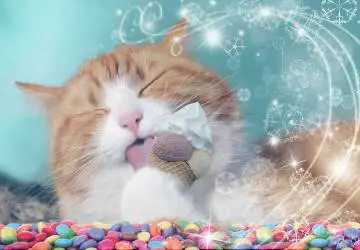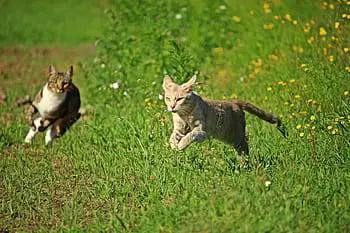Cats are the internet’s favorite pet. They’re cute, cuddly, and hilarious — they can also be a little mischievous at times. If you think you know everything there is to know about cats, then this blog post will give you some new information on your furry friend. Here are 10 things that even the most well-informed cat lover may not have known about their feline friends.
Cats Can’t Taste Sweet Things.

If you give your cat a treat, and it doesn’t seem to like it, there’s a scientific reason for that. Cats don’t have taste buds for sweetness, so they won’t enjoy anything sweet, such as fruit or candy. Their favorite foods are meat-based.
They have a specific gene for a taste that is absent in humans
Cats can’t taste sweet food because they lack a certain protein receptor that allows the human tongue to taste sweetness. A cat’s diet is typically 95% meat-based and 5% vegetable matter or snacks – so don’t be giving your pet anything sweet!
Cats Can Sense Earthquakes Before They Happen.
If you’re a cat owner, you’ll be aware of how good they are at hiding when they don’t feel well or when something is wrong. Some scientists believe that cats can sense the Earth’s magnetic field and react to it in advance of an earthquake.
A cat can feel tremors from an earthquake as much as a few hours before the quake hits. The reason they know before humans are because the body surface of cats is quite a bit drier than a human’s, which in turn makes felines more likely to pick up on electrostatic variances. A group of cats may all suddenly start acting erratically and even aggressively for no apparent reason — they’re sensing something coming!
A Cat will Spend 12 hours of the Day Grooming Itself.
If you think cats are lazy, then think again! Cats spend most of their time grooming themselves. When they’re not eating or sleeping, they’ll be cleaning themselves. This is important for many reasons. It’s essential to their self-care, hygiene, and good health.
Grooming also helps them get rid of loose hair or dirt on their coats that might otherwise cause matting or damage to the fur. They also use grooming as an opportunity to interact with their surroundings by marking out boundaries with scent glands in the paws.
Cats spend about 12 hours a day grooming – that’s more than 50% of their waking hours. The reason for this is that the cat’s tongue has backward-facing spines, called papillae, which act like a comb and remove dead fur and dirt from their coat as they lick it. This means your cat will always look immaculate, even if he just rolled in mud! They only need to clean certain areas, such as the face and paws, because these parts can’t reach with the tongue.
Kittens are Born Deaf, Blind, and Toothless.

Cats are born deaf, blind, and toothless. That’s quite a start in life! Kittens stay with their mother until they’re between 8 and 10 weeks old, and within that time, they usually learn how to hear and see through mimicry of their mother’s actions. Newborn kittens can smell and taste milk, so they know when to suckle.
The ability to see, hear, and smell develops within one week of birth. Kittens are born without these senses because the parts of the brain that control them haven’t developed yet. The kittens’ eyes do start opening at around 10-16 days old, even though they can’t see fully until about three weeks later – their eyes need to stay clean during this time, so there’s no risk of infection.
They can crawl about for around 3 weeks but still rely on their mother for warmth, protection, nutrition, and grooming during this stage. The umbilical cord is left attached to the kitten for between 1-3 days after birth because of the nutrients from the placenta.
But what an owner might notice is the peculiar way in which a mother cat will nuzzle her kittens with her nose or lick around their heads after birth — this helps stimulate the proper development of these functions. Isn’t it amazing?
Cats Have a Strong Sense of Smell.
Many people don’t realize just how good cats are at smelling. They have about 200 million scent glands compared to a human’s 5 million, and there’s a reason why they’re so good at it! Cats need such an incredible sense of smell to be able to tell one cat from another and also to help them find their way around by smelling the objects around them. They can identify specific odors like catnip and their own urine.
You might think that cats’ sense of smell isn’t as strong as dogs’, but this is actually quite a common misconception. Cats can smell even better than dogs in some situations, and their ability to track down prey relies on this skill. They can sniff out a scent from around 12-100 feet (3.7-30 meters) away, and they don’t need to be within line of sight to do so.
Cats with white fur tend to have slightly worse senses of smell than those with darker coats because the lack of color makes it harder for them to absorb light for use with sensory cells in the nose. A cat’s sense of smell mostly works by detecting molecules arising from the source of the odor.
Cats Will Hunt Even if They’re Not Hungry!

Cats are natural hunters, and it’s in their instinct to do so. It also means they’ll hunt even if they’re not hungry, so pet owners should always keep this in mind when letting them out of the house. 1 However, most cats won’t go far because they don’t stray too far from home – most domesticated cats will only cover about 500 meters per day.
We all know that cats can kill mice and birds very easily, but did you know there are actually around 500 million domestic cats killing between 1-4 billion birds each year? Cats can cause problems with local wildlife populations.
Scent, not sight or sound, is the most reliable way that a cat identifies something, and they use it more than their other senses. So what instinct makes them hunt? Predatory behavior is actually linked to play, and cats will imitate the behaviors of prey for this reason. They often do so with toys and also their owners by pouncing on their hands at times! It’s natural for cats to play-hunt because it aids exercise and helps develop coordination, strength, and flexibility.
Your Cat Knows When You’ve Been Out With Another Animal!
Your cat’s nose pad has ridges that help them use chemical signals to identify other cats in its territory. You might not realize it, but your cat knows when you’ve been around another animal, even if it can’t see or hear them!
If a cat rubs against someone’s leg, this leaves behind a chemical signal that the other cats in their territory will detect. It’s actually part of their way of marking territory and identifying themselves. The hormones from the sweat glands also help to leave behind a scent from their skin to mark what they are – it even works with humans!
So why do cats really rub up against furniture legs? This is because they leave these signals on objects too, which helps make sure other animals know where their territory begins and ends – especially important for outdoor cats who wish to protect their area from any potential intruders.
Cats Can’t See in Complete Darkness.
Many people think cats are able to see in total darkness, but this is not true.
Cats have excellent night vision because of the tapetum lucidum, a layer of tissue behind the retina that reflects light back through it rather than absorbing it, as with humans. This means more available light for use by the photoreceptors at the rear of their eyes – their eyes are actually extremely sensitive to light, and they can’t stand bright lights when awake, either! It’s also why their pupils get smaller when exposed to brighter light since less light will be reflected back.
Why would cats need such great night vision? Well, in prehistoric times, they were nocturnal hunters, so they evolved these adaptations over time.
You probably know that cats are super-sensitive to movement, but did you also know that they can see colors? Cats actually do have a limited color range. They see some colors as washed-out versions of their more vibrant counterparts. For example, green will appear as a light blue or gray.
The Average Cat Sleeps Between 12 and 16 Hours per Day.

This is because cats can’t make their own vitamin C and need to get it from their diet or supplements. This might actually be why they sleep so much – because they’re trying to conserve as much energy as possible – this also means they can be more active when awake!
They sleep more when they are younger, and their metabolism slows down as they age. Cats will sleep where it is the most comfortable for them, but generally, this means on something elevated with a good view of their surroundings.
Cats are Very Curious Creatures.
Cats are known to be very curious, and this is because they have a tendency to explore their surroundings. 2 They do so using their sense of smell, but can also do so by taste or even touch since they have some whiskers on the front of their face that help them find their way around more easily.
If you’ve ever noticed your cat play with something they found, then try bringing that item into the home — such as a piece of string or perhaps an odd-shaped toy, then this is probably what happened. Your cat is just trying to figure out if it’s anything of interest! This behavior actually helps increase coordination and flexibility in cats since many things they will play with involve movement and flexing certain muscles.
Conclusion.
I hope you found the article interesting and helpful to your understanding of cats. Please, leave your comments about curious things about your cat!!!

Meet Brenda Tillman: your go-to expert in Cognitive Behavioral Therapy! Not only is she a seasoned therapist, but she’s also a passionate mom blogger who never misses a beat. Dive deep into her insightful blogs, backed by her extensive coursework in Parenting Skills, Learning, and Education. Brenda’s heartwarming family – a son, two daughters, and their adorable pets – often take center stage in her writings. From parenting hacks and relationship tips to health & fitness nuggets, Brenda has been enlightening her readers for over half a decade. Stick around, and you’re bound to discover gems from a mom who wears many hats with grace!
Reviewed By: Joanna Perez and Marcella Raskin
Edited By: Lenny Terra
Fact Checked By: Gabrielle J. Smith
Photos Taken or Curated By: Matthew Mansour